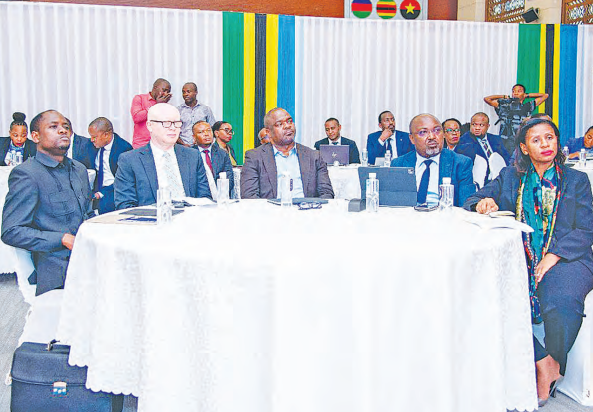Legal reforms key to TZ’s trillion-dollar future

KIBAHA: TANZANIA’S ambition to become a trillion-dollar economy by 2050 is not just about infrastructure or production it is about the strength of the laws that govern how the nation invests, partners and grows.
Behind every major project, public institution and partnership lies a legal framework that determines whether national aspirations will thrive or stall.
That message resonated strongly in Kibaha, Pwani Region, where on October 16, 2025, senior government officials met to deliberate on how to realign Tanzania’s legal environment with the goals of Dira 2050.
The working session brought together the Office of the Treasury Registrar (OTR), the Office of the Attorney General, the Office of the Solicitor General and the Office of the Chief Parliamentary Draftsman a rare convergence of minds that underscored the gravity of the moment.
At the core of the discussions was a shared conviction: Tanzania cannot realise its trillion-dollar dream unless it builds laws that enable, not constrain, investment.
Treasury Registrar Nehemiah Mchechu said President Dr Samia Suluhu Hassan has directed a comprehensive review of investment-related laws to align them with the nation’s long-term economic aspirations.
“We must have laws that enhance the efficiency of public institutions,” he said. “We need laws that expand opportunities for the public sector to work closely with the private sector.”
Mr Mchechu explained that efficiency reforms within public entities are central to achieving President Samia’s directive of increasing their contribution to domestic revenue from 4 per cent to 10 per cent within the next four years.
“We must improve our services and products while minimising unnecessary expenditures to boost revenues and, ultimately, dividends to the government,” he said.
The Treasury Registrar noted that Tanzania’s Sh92.3 trillion investment portfolio spanning public institutions and companies where the government holds minority shares must now deliver higher productivity and greater returns.
But this, he said, can only happen when institutions operate under a modern, flexible and predictable legal framework that encourages innovation and partnerships.
Deputy Attorney General Samwel Maneno reinforced this point, emphasising that the strength of both public and private sectors depends on the quality of laws that govern them.
He cautioned that weak contract management has, in some cases, delayed government objectives and discouraged investors. “Such a situation can also trigger disputes,” he noted.
“Contract management is a top priority area for us. In a single financial year, we oversee between 15,000 and 20,000 contracts. To ensure efficiency, we are embracing technology to facilitate monitoring.”
Mr Maneno also stressed the importance of minimising unnecessary bureaucracy, particularly in Public-Private Partnerships (PPPs), saying that delays in approvals and coordination often erode investor confidence.
“To build a trillion-dollar economy, our legal processes must be clear, efficient and supportive,” he added. For Solicitor General Dr Ally Possi, the task at hand extends beyond reviewing specific laws it is about changing how the law interacts with investment.
“Laws should not be barriers; they should attract investors,” he said.
He underscored that achieving the 1 trillion US dollars goal will depend heavily on a business environment that promotes predictability, fairness and simplicity.
Dr Possi highlighted the need to strengthen contract management, especially in PPPs and emphasised that public institutions must generate dividends and contribute meaningfully to national economic growth.
“However, this cannot be achieved if such institutions are burdened by lawsuits that compel them to pay compensation following court rulings,” he said. “That’s why we are here to discuss how best to address legal gaps.”
He assured that his office, alongside the Attorney General’s Office, will continue offering legal support to the OTR and the institutions it oversees.
“For the OTR and public entities to perform handsomely, cooperation with our offices and the Chief Parliamentary Draftsman is inevitable,” he said, adding that citizens should have confidence that the 92.3tri/- public investment is safe.
He urged all public entities with government shareholding to consult his office whenever facing legal challenges to safeguard national interests.
Meanwhile, Chief Parliamentary Draftsman Onorius Njole underscored that achieving a trillion-dollar economy will depend on the strength of public institutions, which in turn rely on solid, forwardlooking laws.
“Public entities must be governed by investment laws that align with current needs,” he said. “The legal framework must match the pace of investment growth within public corporations.”
At the operational level, technology is emerging as a crucial ally.
Mr David Shambwe, Director of Performance Management for Non-Commercial Entities at the OTR, said digital tools could transform how contracts and partnerships are managed.
“We need to speed up efforts to address conflicts related to investment by embracing technology AI if possible,” he said, emphasising that digitalisation could prevent costly disputes and improve accountability.
By the end of the Kibaha session, one theme had clearly stolen the show: the urgent need for investment-friendly laws.
It became the unifying thread linking every contribution from law reform to contract oversight, from performance management to technological innovation.
All participants agreed that Tanzania’s trillion-dollar journey depends not only on infrastructure and innovation but also on a legal system strong enough to support them both.
What emerged from the discussions was a powerful realisation: laws are not just instruments of governance they are catalysts for growth.
ALSO READ: Where CEOs see public entities in the next 25 years
As Tanzania accelerates legal reforms under Dira 2050, the country’s legal foundation is being quietly re-engineered to match the scale of its ambition.
And in that re-engineering lies the blueprint for transforming Tanzania into an upper-middle-income economy, built on laws that empower, protect and propel national prosperity.





